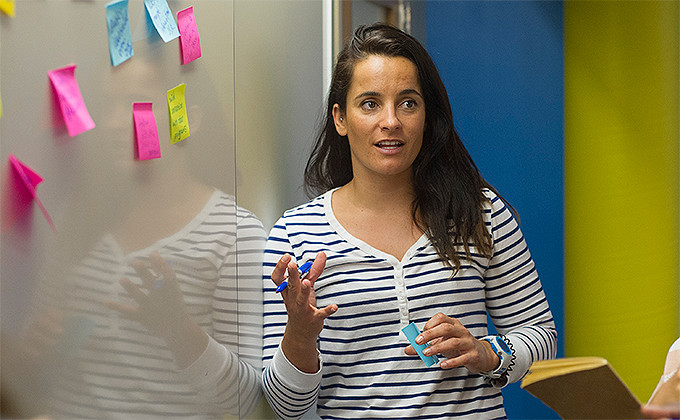Dear budding journalist:
On Monday, my dear colleague Felix Salmon gave some (frequently solicited) advice to young journalists trying to break into media: As he summarized it himself, “Don’t do it.”
Salmon said it’s never been more competitive, that the future will be more so, and that the privileged class that has traditionally found well-paying media jobs is being disrupted, with elite degrees and family connections no longer guaranteeing success.
And though much of what Salmon said is true, I think that getting into journalism is more exciting than ever before. With new challenges, yes, but even more opportunities for a wider group of voices than we’ve ever heard, and the chance to build a media career that is uniquely theirs, rather than defined by structures set in places decades or centuries prior.
I should know, because that’s exactly what I’ve done as director of interactive at Fusion, where I tell the news with images, words, and video, in forms static and otherwise.
I did not set out to become a journalist but a communications designer.
When I began my career as a motion graphics designer, I thought I would be confined to the advertising industry, telling stories to sell products and services to people.
Telling stories that matter
I soon became frustrated, however — I was eager to tell stories, but I was not telling the stories that truly mattered to me — so I began searching for work that would provide me with a feeling of accomplishment.
I felt a bit lost: I didn’t know what opportunities might exist for more fulfilling work, but I fought doubts and fears gnawing at me and explored what was out there.
What I realized was this: News was making the tumultuous shift from print to digital, and audiences were hungry for video and, more importantly, the chance to be part of the conversation. As someone in the world of graphic culture and motion graphics, I understood my skills and background could bring something new to the table.
Now there was not only room for me, but a need for others like myself: Fresh minds with new approaches and a desire to serve a generation of readers who wanted to be part of the conversation, where the story is no longer presented as a monologue but as a dialogue between readers, journalists, activists, artists, and experts, all building off one another.
A chance to reinvent what “media” means
Let me be clear: Journalism is undergoing a huge shift, and change doesn’t happen easily. But this shift also provides a whole bunch of new and exciting opportunities as we adapt and reinvent our notions both of what it is to be a journalist and what “media” means.
Journalists, entrepreneurs, and activists are joining forces to make a difference in a world where corruption, inaccessibility of information, abuse of power, discrimination and bad policies are the topic of the day.
Look at all the amazing new ventures created to take on the new kinds of media work that needs to be done, from outlets like Vox Media, AJ+, The Marshall Project, The Skim, Quartz, and The Conversation, to my beloved Fusion.
Though being a white, intelligent and privileged male with height, education, and a nice accent still helps, it no longer guarantees a life of career safety. And expecting luck to help build or make your career is a dangerous strategy.
What some of the most exciting journalists working right now have in common is that they care, have a story to tell, and want to make a difference. They come from all sorts of backgrounds: Design, engineering, geography, political science, finance, sociology, ecology, film and anthropology. They know they have insights and perspective to add to the conversation. Some of them work alongside me at Stanford, where I’m completing a JSK Knight Fellowship. There’s one woman who is trying to reinvent how videos are consumed on mobile. Another is working to figure out why our attention spans are decreasing when consuming stories online and another JSK fellow is committed to making it easier for journalists to get access to information that should be free.
All these journalists are trying to find solution by questioning facts that used to be taken for granted. They — and organizations who believe in the future of media, like the Knight Foundation, the International Centre for Journalists, and the JSK Knight Fellowship at Stanford — realize that the opportunities are there, but only if we change the mindset.
I wouldn’t be here if I had quit before I started. My advice is simple: If you love it, don’t leave it!
This article was first published on fusion.net. Santos is director of interaction at Fusion, an ABC-Univision joint venture.




